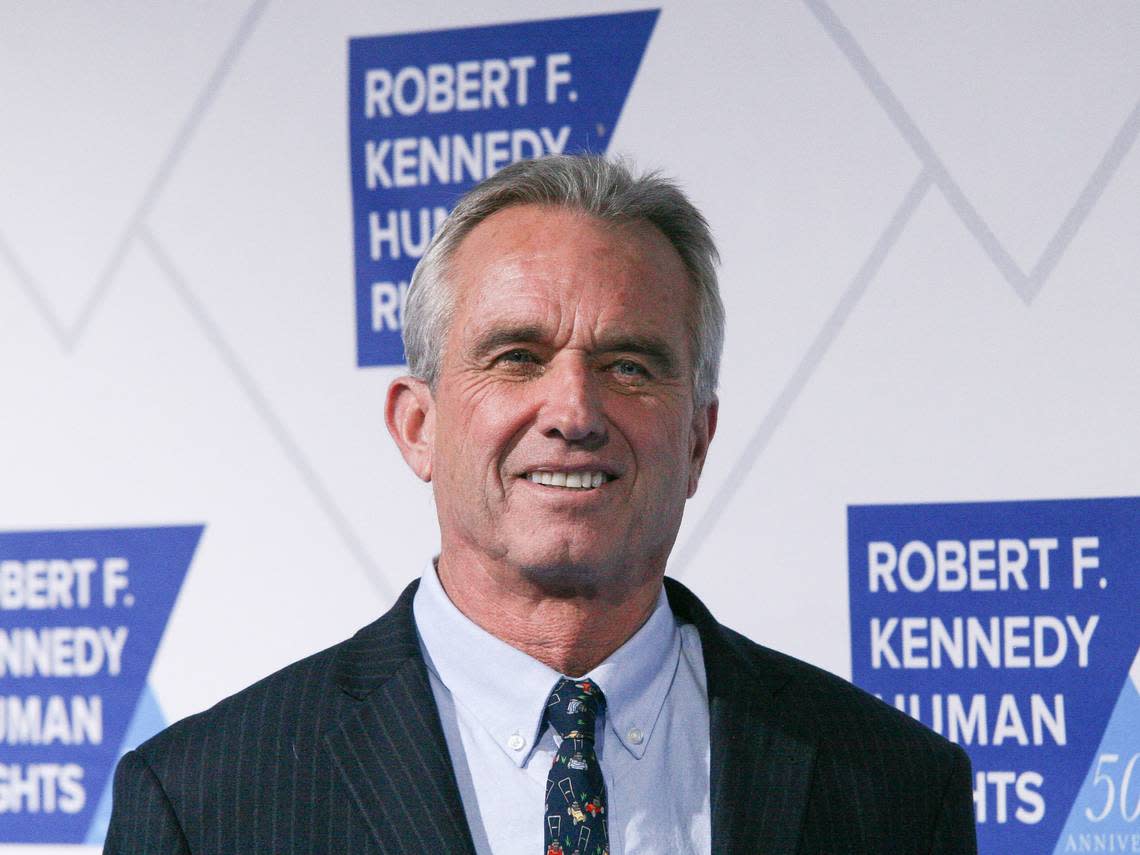RFK Jr. blasts Biden over lack of Secret Service. But is his situation unprecedented?

- Oops!Something went wrong.Please try again later.
Ever since Robert F. Kennedy’s assassination in 1968, many prominent presidential candidates have been protected by the U.S. Secret Service.
But now, in the lead-up to the 2024 election, one notable candidate has gone without government security: RFK Jr., Kennedy’s son.
An independent candidate with a strong base of support, RFK Jr. has said he’s been refused Secret Service protection by President Joe Biden’s administration.
“I’m the only presidential candidate in history whose request has ever been denied,” Kennedy said in a Dec. 3 post on X, formerly known as Twitter.
The Biden Administration initially rejected RFK Jr.’s request for protection in the summer despite documented death threats against him, according to a July 28 post on X.
But, while the executive branch holds the power to grant government protection to candidates, it typically only does so for those who meet certain criteria, according to officials and presidential historians.
Several prominent candidates have gone without the safeguarding of the Secret Service in the past, though RFK Jr.’s case appears to be a “special kind of situation,” Thomas Balcerski, a presidential historian at Eastern Connecticut State University, told McClatchy News.
How does the process work?
Following the 1968 death of Robert F. Kennedy — who was gunned down while campaigning for the Democratic nomination — Congress passed legislation requiring major presidential candidates to be given Secret Service protection, according to the U.S. Secret Service.
The determination of which candidates receive protection is made by the Homeland Security secretary upon consultation with the Congressional Advisory Committee — composed of the House speaker, Senate majority leader and other congressional leaders.
In making their decision, the secretary holds “broad discretion,” though several factors may be taken into consideration.
Among the factors are candidates’ polling results. Specifically, third-party candidates who poll 15% or higher for a month or more should be considered for a Secret Service detail.
Additionally, the “formal or de facto” nominees of major parties should also be reviewed for protection.
Typically, this protection is granted between 365 and 120 days before an election, though it can be authorized earlier.
Which candidates have received protection?
In the lead-up to the 2020 election, Biden, a former vice president, received a Secret Service detail fewer than eight months before Election Day, according to CNN. His opponent, President Donald Trump, already had Secret Service protection as the incumbent.
Trump was first granted government protection in November 2015, one year before the 2016 election, according to Politico. Ben Carson, a fellow Republican candidate, also received a detail. The eventual Democratic nominee, Hillary Clinton, already had a government detail as a former first lady, according to CNN. Her main rival, Sen. Bernie Sanders, was given protection in February 2015, roughly nine months before the election.
Heading into the 2012 election, a handful of White House hopefuls were provided with Secret Service details, including then-Sen. Barack Obama, according to Alexis Coe, a presidential historian and fellow at New America, a public policy think tank.
“Obama, who was the first black candidate from a major political party, faced unique threats and therefore was granted Secret Service protection early on,” Coe said.
Republicans Rick Santorum, Newt Gingrich and Mitt Romney — who eventually became the party nominee — were also flanked by government agents, according to news reports.
Multiple candidates, though, some with high levels of support in the polls, have not been flanked by Secret Service agents on the campaign trail.
Ross Perot, a popular independent candidate, went without government protection during the 1992 election, according to Slate.
“Perot delighted in pointing out that he hadn’t enlisted the Secret Service’s aid, half-jokingly telling supporters that he didn’t need any bodyguards because ‘everybody loves me,’” according to the outlet.
More recently, former Vice President Mike Pence, while campaigning for the Republican nomination for the 2024 election, did so without government protection, Balcerski said.
“So there is a sense that even prominent former people as high as vice president — but not president — have basically lost that privilege to this protection,” Balcerski said.
‘Special kind of situation’
RFK Jr., though, in asking for Secret Service, is “a very special kind of situation,” Balcerski said.
“I think denial is really the key word here because you have RFK Jr. making the request,” Balcerski said. “There have not been high profile requests (like this) that have been denied.”
Further, because of his Kennedy name, his request for aid resonates more than if he were any other candidate, both Coe and Balcerski said.
“My understanding was that Kennedy was averaging about 15%,” Coe said, “so he really doesn’t track on the same level” as other candidates like Trump or Biden.
“I think if he weren’t RFK Jr., I don’t think this is a story,” Balcerski said.
Still, he said, the government’s decision not to give him Secret Service, in light of threats made against him and his popularity in the polls, seems “shortsighted.”
JFK was killed 60 years ago. Why are his assassination records still sealed?
Santos gets expelled from Congress. Now Fetterman says this senator should be next
Why is there a generational divide on Israel in the US? Experts explain

